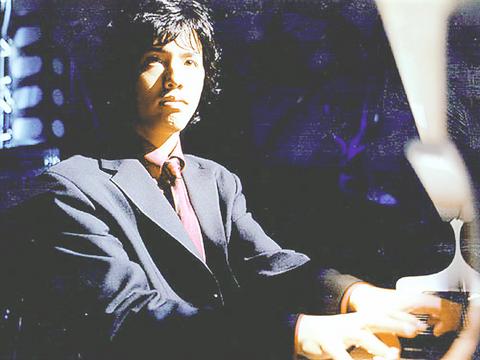Ask any astute Taiwanese observer of the local classical music scene why all the tickets are sold for Yundi Li's Taipei concert on Sunday and you will get the reply: "Because he's Chinese."
Yundi Li, still only 20, rocketed to the attention of audiences and CD buyers in Europe and Asia following his sensational winning of Warsaw's Chopin Competition, the first time its top prize had been awarded to anyone in 15 years. His first CD Yundi Li: Chopin sold exceptionally well, and has been followed by Yundi Li: Liszt and two others, one issued in Japan. And he has still to make his debut, live or on disc, in the US.
The fact that he's Chinese may influence some ticket-buyers, overjoyed to see someone of his ethnicity beat the foreigners at what could be perceived as their own game. Nevertheless, there have been many before him, and in every department of classical virtuosity. This week alone has seen several such in Taipei for Lin Cho-liang's International Music Festival, but the loudest applause at last Monday's concert was for Gil Shaham and Lynn Harrell, notably non-Chinese musical stars.

PHOTO COURTESY OF MNA
Another element in Yundi Li's phenomenal success may be his youthful good looks, plus the way these have been used by Deutsche Grammophon in promoting his recordings.
Nevertheless, the heart of the matter is that Yundi Li is an outstanding artist in his own right. His Liszt CD is brilliant in every way, combining the utmost delicacy with total interpretative authority and, where necessary, power. All the indications are that here is a major international pianist, supremely talented by any standards, with a long career ahead of him.
His three Taiwan concerts will feature Chopin's four Scherzos, followed by the arduous Sonata in B Minor of Liszt which opens his Yundi Li: Liszt CD.
This is a rather uncompromising program, to put it mildly. Chopin's scherzos (he only wrote these four) are not like what most listeners will expect from this composer. And the Liszt sonata is bravura stuff, but hardly familiar to non-specialists.
Yundi Li, in other words, is making no allowances for popular taste, but instead assaulting some very difficult music head-on. There can be little doubt, however, that there will be encore items at the end, and these are likely to be of more familiar material.
Sunday's concert in Taipei is sold out, but tickets from NT$800 to NT$1,500 were available for Tuesday's concert in Kaohsiung and Thursday's in Taichung as of press time.
Yundi Li will perform at the National Concert Hall, Taipei on Sunday at 7.45pm; at Chihte Hall, Kaohsiung, 25 March, 7.30pm, and at Chunghsing Hall, Taichung, 27 March, 7.30pm. Tickets are available through ERA ticketing.

June 9 to June 15 A photo of two men riding trendy high-wheel Penny-Farthing bicycles past a Qing Dynasty gate aptly captures the essence of Taipei in 1897 — a newly colonized city on the cusp of great change. The Japanese began making significant modifications to the cityscape in 1899, tearing down Qing-era structures, widening boulevards and installing Western-style infrastructure and buildings. The photographer, Minosuke Imamura, only spent a year in Taiwan as a cartographer for the governor-general’s office, but he left behind a treasure trove of 130 images showing life at the onset of Japanese rule, spanning July 1897 to

One of the most important gripes that Taiwanese have about the Democratic Progressive Party (DPP) is that it has failed to deliver concretely on higher wages, housing prices and other bread-and-butter issues. The parallel complaint is that the DPP cares only about glamor issues, such as removing markers of Chinese Nationalist Party (KMT) colonialism by renaming them, or what the KMT codes as “de-Sinification.” Once again, as a critical election looms, the DPP is presenting evidence for that charge. The KMT was quick to jump on the recent proposal of the Ministry of the Interior (MOI) to rename roads that symbolize

On the evening of June 1, Control Yuan Secretary-General Lee Chun-yi (李俊俋) apologized and resigned in disgrace. His crime was instructing his driver to use a Control Yuan vehicle to transport his dog to a pet grooming salon. The Control Yuan is the government branch that investigates, audits and impeaches government officials for, among other things, misuse of government funds, so his misuse of a government vehicle was highly inappropriate. If this story were told to anyone living in the golden era of swaggering gangsters, flashy nouveau riche businessmen, and corrupt “black gold” politics of the 1980s and 1990s, they would have laughed.

It was just before 6am on a sunny November morning and I could hardly contain my excitement as I arrived at the wharf where I would catch the boat to one of Penghu’s most difficult-to-access islands, a trip that had been on my list for nearly a decade. Little did I know, my dream would soon be crushed. Unsure about which boat was heading to Huayu (花嶼), I found someone who appeared to be a local and asked if this was the right place to wait. “Oh, the boat to Huayu’s been canceled today,” she told me. I couldn’t believe my ears. Surely,